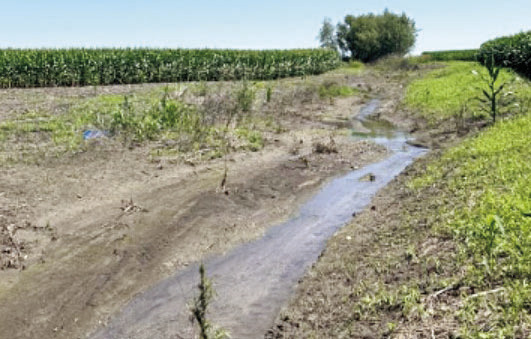WASTEWATER WOES: PART TWO
Editor’s note: This is the second part in a threepart series on how local government and residents are dealing with concerns about a growing population and wastewater.
When city leaders and residents began considering the impact of explosive growth, one of the top concerns was the water supply. Today, that concern has been replaced by wastewater worries.
As of Sept. 15, the Texas Commission on Environmental Quality shows 126 active permit applications for sewage treatment plants in Williamson County and more than 3,500 statewide. Many of these are city or Municipal Utility District developments, but some are privately owned plants that will send residential wastewater flowing across neighboring properties through open ditches and small streams.
“I think one of the unintended consequences (of recent state legislature) has been not appreciating what a MUD and, typically, a discharge permit that would follow would mean,” said Precinct 4 County Commissioner Russ Boles. “Williamson County is such a popular place to live that we are seeing numerous applications for MUDs and discharge permits at a rate far beyond most other places in Texas.”

Developers building in a city’s extraterritorial jurisdiction have the choice of either hooking into the city’s sewage system or building their own sewage treatment plant on-site. In many cases, it is initially less expensive to create an on-site plant, known as a package plant, to handle the residential wastewater rather than pay the infrastructure fees needed to hook into city lines.
On the TCEQ application for a package plant just outside Taylor, engineers for developer NMCV Taylor Property Investors LLC report that the difference in cost is about $900,000.
“Connection to the Taylor Wastewater System using the lower-cost alternative (cross country) would cost an estimated $5.5 million,” the application states. “The city has indicated it is not interested in funding any portion of the line costs, or offsetting impact fees. The proposed alternative is to construct an on-site wastewater treatment system to serve the entire subdivision.”
That on-site wastewater system would cost an estimated $4.6 million. And while it costs more to hook into city infrastructure, officials said that lowering fees for residential development is a hard call because it shifts the cost of construction to existing taxpayers.
On the other hand, sewage running through neighborhoods may have an impact on growth when future opportunities for annexation occur, and between that and the local residents asking for help, Hutto and Taylor have both taken steps to oppose some of these package plants.
Taylor spokesman Daniel Seguin said the city does intend to oppose the NMCV Taylor Property Investors package plant.
He said Taylor has agreements with some property owners in the ETJ to annex their lots in the future, so that any development would be under city guidance, precluding the risk of having a neighborhood wastewater treatment plant, or WWTP.
“When the property is not in city limits, we have no jurisdiction over it,” Seguin said. “When the property is in the ETJ but does not have an annexation agreement, we still review developments and can (and do) protest the installation of package plants and water utilities. This is to ensure thoughtful growth of the city while maintaining high standards for new developments that will keep costs low in the future.” Hutto also opposes package plants built within its ETJ and has hired attorney Joe Freeland of Mathew & Freeland LLP of Austin as an expert witness to help the city present its concerns to TCEQ.
The city has also looked at creative ways to eliminate developers’ needs to build privately owned sewage plants.
Hutto successfully thwarted a plant that would have sent treated wastewater down a ditch in front of an elementary school by working with Round Rock’s City Council. Hutto agreed to release the property from their ETJ so Round Rock could work with the developers, 705 Limmerloop JV LLC.
The parties negotiated an agreement to connect the new subdivision into the Round Rock municipal wastewater system.
In another instance, Hutto accelerated the expansion of its municipal sewage lines into a fastgrowth area to forestall a developer from needing a package plant.
And earlier this month, the city entered into a wholesale wastewater agreement with Williamson County to provide wastewater service to a nearby development in the ETJ known as Halcyon. Hutto Mayor Mike Snyder said the effort was successful because the developers were willing to work with the city to find a solution that benefited everyone.
“They were going to build a package plant, they were pretty much done, and we were able to get them to come back to the table,” Snyder said. “As we keep seeing the package plants, we keep focusing on them. It is a laser focus.”
Part of the municipal defense against the rise of package plants is to build more wastewater infrastructure, making it less expensive for developers to access. Hutto is building a $180 million WWTP expansion, a project that will increase the city’s capacity from 2.6 million gallons per day to 6 million gallons per day. Hutto and Taylor are also partnering up on a regional wastewater project, funded in part by Williamson County with $10 million from the American Rescue Plan Act.
“I believe package plants should be a last resort. Nobody’s reached out to me and said the city’s screwing them around and they can’t get proper permits,” said Snyder at a March City Council meeting. “Instead, I think they’re taking the path of least resistance.”
Seguin said package plants can be a maintenance nightmare residents can be saddled with over the years. He said some cities end up bearing the burden of replacement in the future, ensuring neighbors have to pick up the tab.
“We are dedicated to protecting current and future residents of Taylor and ensuring these developments do not put a financial burden on existing residents,” he said.






